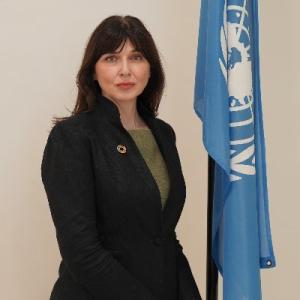Dear excellencies,
Dear partners and colleagues,
Ladies and gentlemen,
It is a great pleasure to be with all of you today for this important international conference on humanitarian mine action and the Sustainable Development Goals.
This conference is being held just a few days ahead of the International Day for Mine Awareness and Assistance in Mine Action under this year’s theme – ‘Safe Ground, Safe Steps, Safe Home’.
This theme highlights the importance of restoring the personal security of individuals and communities in post-conflict settings.
For there really is no place like home – and yet it is difficult to feel at home without security or community.
Mine-clearance experts are working hard throughout the world, at considerable risk to themselves, to eradicate the threat of explosive ordnance.
Despite these efforts, mines continue to kill and maim civilians on a daily basis.
In 2020 alone, the UN mine action community reported that over 7,000 people had been killed or injured by mines, and explosive remnants of war.
This terrible threat lies in wait for children on their way to school, women on their way to work, families traveling to the market, and peacekeepers on patrol.
It is clear that we must do better, as an absolute priority.
In recommitting to our aim of a mine-free world, the focus of our efforts should be on three key areas.
The first of these key areas is that of expanding capabilities and capacities.
The rapidly evolving nature of explosive threats means it is crucial to ensure that those on the front lines have sufficient expertise, resources and equipment when working in areas rife with the threat of explosive ordnance.
The second key area is that of building partnerships.
Strong partnerships between national and international stakeholders will remain critical for the success of all humanitarian mine action programmes, and I hope to see this conference pave the way to strengthen such a collaborative approach.
The third key area is integrating mine action and development.
Our immediate endeavours to save lives must be accompanied by efforts to help those already affected by explosives. This includes ensuring the delivery of adequate services for victims and promoting the rights of persons with disabilities.
Ladies and gentlemen,
This year we mark two important milestones: 30 years of Azerbaijan membership to the UN and 30 years of UN presence in Azerbaijan.
We have collectively achieved many results over these three decades .And one thing that I am particularly proud of is the UN’s family longstanding partnership with ANAMA.
UNDP has been supporting ANAMA since 1999, and thanks to the generous funding of many donors, over 33 million square meters of land have been cleared of mines.
In parallel, UNICEF has been supporting ANAMA in promoting explosive ordnance risk education, a key element for the safety of local populations in contaminated areas. They’ve already reached over 100,000 people, including more than 35,000 children.
The path towards achieving the 2030 Agenda for Sustainable Development must be clear of landmines and explosive remnants of war. In addition to saving lives and preventing injuries, mine clearance is vital for rebuilding infrastructure, education and agriculture. It can also be a strong driver for inclusion, particularly of women and people with disabilities.
The UN family will keep standing side by side with the Government of Azerbaijan to ensure that every woman, man and child is safe in their homes.
I would very much like to thank the Government of Azerbaijan, ANAMA and UNDP for organizing this important event.
I would also especially like to thank ANAMA team all those brave people who tackle these explosive threats on a daily basis – at great personal risk.
It is your efforts that help the rest of us to enjoy safe ground, safe steps and safe homes.
Thank you!






